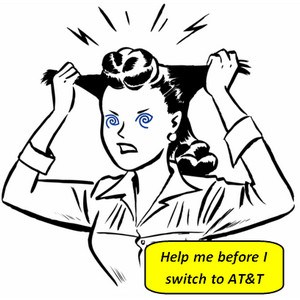
Lowering the bar on customers by increasing the maximum overlimit fee. It’s another example of Rogers’ Broadband Limbo Dance.
Rogers Communications is quietly notifying its broadband customers it is doubling the overlimit fee for excessive use of its broadband service from $50 to $100, effective Aug. 16, 2012.
The company characterizes the new maximum fee as “protecting you from unexpected high charges,” but of course does nothing of the sort. Rogers’ charges eastern Canada some of the continent’s most expensive prices around for usage-limited broadband. Its Internet Overcharging scheme has relied on all of the classic tricks of the trade to get consumers to pay higher and higher prices for broadband service, while assuring investors the company can rake in additional profits at will just by adjusting your allowance and overlimit fee.
Companies that introduce usage caps and consumption billing are monetizing broadband usage. By adjusting prices upwards and reducing usage allowances, customers can find themselves paying confiscatory overlimit fees. But until recently companies in Canada capped the maximum overlimit penalties. Over the last three years, those maximum fees have increased dramatically, and some companies like Cogeco have removed the maximum limit altogether.
While Rogers’ cost to deliver service continues to decline, these kinds of policy changes can cause broadband bills to soar, especially when customers are in overlimit territory.
Rogers (with thanks to Broadband Reports readers who shared the text):
“To protect you from unexpected high charges, we currently cap the maximum monthly amount you can be charged for additional internet usage at $50 in addition to your Hi-Speed Internet plan’s monthly service fee, modem rental fee (if applicable) and taxes. Effective August 16, 2012 this monthly limit will be increased to $100 in addition to your plan’s monthly service fee, modem rental fee (if applicable) and taxes. If you exceed the monthly usage allowance included in your Hi-Speed Internet plan you will begin to see charges up to the new limit beginning on your first invoice on or after September 16, 2012. All other aspects of your Rogers service(s) will remain the same. Remember, you can track your internet usage online by signing into My Rogers at rogers.com/myinternetusage. For more information or questions please contact us in any of the ways listed on page 2 of this invoice. Thank you.”
Customers can use the occasion of Rogers’ contract changes to potentially switch providers without paying early cancellation fees. This process is more straightforward in Quebec, according to the company’s terms and conditions.
Quebec Residents Only
Unless otherwise specified in the Service Agreement, we may change, at any time, but upon no less than 30 days’ prior written notice to you:
- a) with respect to a plan or Service not subscribed to for a Commitment Period (as defined below), any charges, features, content, functionality, structure or any other aspects of the plan or Service, as well as any term or provision of the Service Agreement, and
- b) with respect to a plan or Service subscribed to for a Commitment Period, any aspect of the plan or Service, as well as any term or provision of the Service Agreement, other than essential elements of the plan, Service or Service Agreement.
If the change entails an increase in your obligations or a decrease in our obligations and if you do not accept such a change, you may terminate your Services without an ECF (as defined below) by sending us a notice to that effect no later than 30 days after the amendment takes effect.
Rogers’ Customers Elsewhere in Canada
Unless otherwise specified in the Service Agreement, we may change, at any time, any charges, features, content, functionality, structure or any other aspects of the Services, as well as any term or provision of the Service Agreement, upon notice to you. If you do not accept a change to the affected Services, your sole remedy is to terminate the affected Services provided under the Service Agreement, within 30 days of your receipt of our notice of change to the Services (unless we specify a different notice period), by providing us with advance notice of termination pursuant to Section 34. If you do not accept a change to these Terms, your sole remedy is to retain these Terms unchanged for the duration of the Commitment Period (as defined below), upon notice to us within 30 days of your receipt of our notice of change to these Terms.
While Quebec residents have a clear path to avoid Rogers’ ECF, customers elsewhere may be subject to an early cancellation fee because of Section 9 of Rogers’ agreement:
Unless otherwise set out in the Materials, if you agree to subscribe to one of our plans or Services for a committed period of time (the “Commitment Period”), you may be subject to an early cancellation fee (“ECF”) for each Service. Any decrease in your Commitment Period may be subject to a fee. If your Service is terminated prior to the end of the Commitment Period, you will pay us an ECF as specified in the Service Agreement, plus taxes.
Customers outside of Quebec may want to check with Rogers directly to determine if an early cancellation fee will apply when canceling service because of the change in maximum overlimit fees.
Customers leaving Rogers can find better deals for broadband services from independent ISPs like TekSavvy or Start.


 Subscribe
Subscribe








